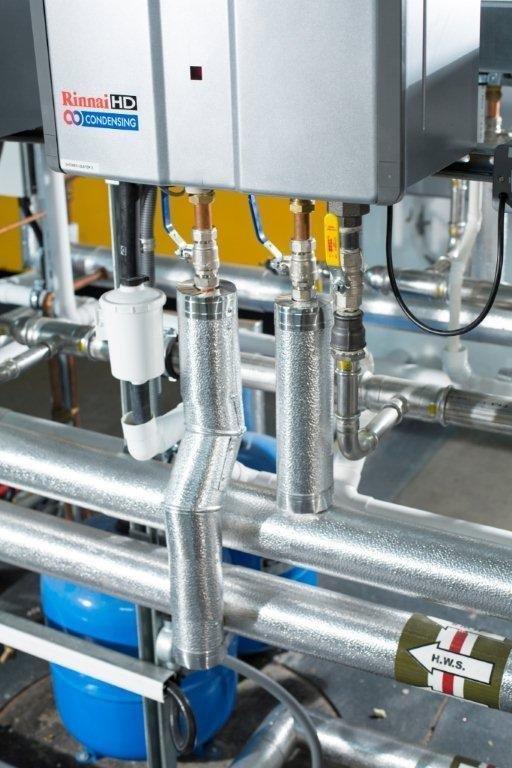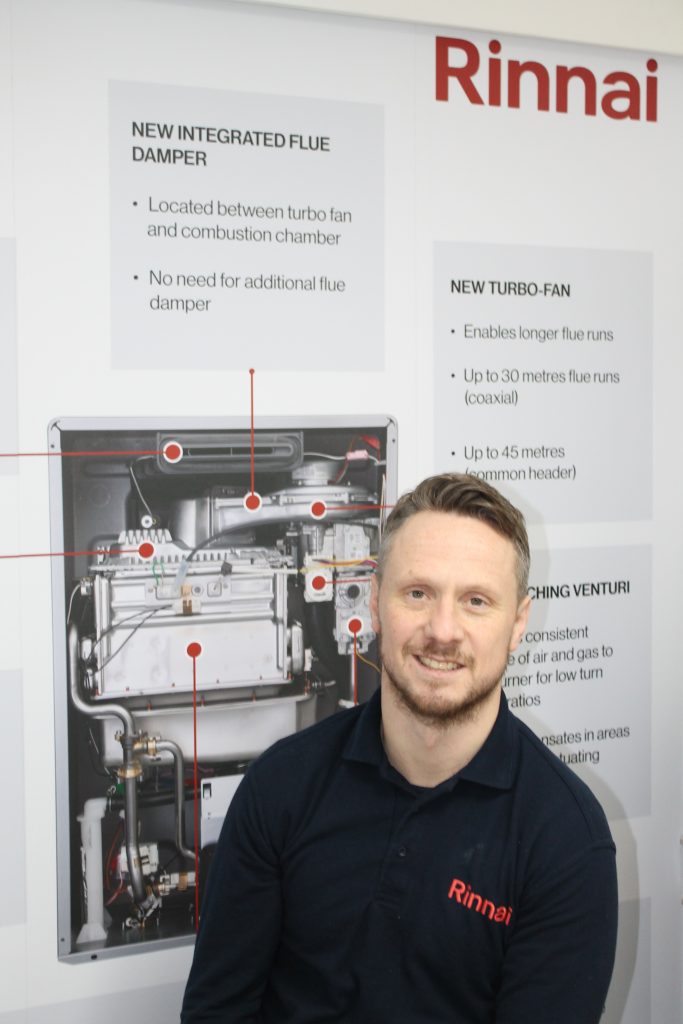
Chris Goggin of Rinnai UK looks at the state of play of new fuels in the mass marketplace.
A national roll-out converting the UK’s energy resources is needed for the UK to be completely decarbonized by the year 2050. For this to be made possible a vast amount of work needs to be planned, undertaken and completed in a national effort which lacks living experience in this unfamiliar process. A report carried out for the Department of Business, Energy & Industrial Strategy – Appraisal of Domestic Hydrogen Appliances, Frazer Nash Consultancy – has underscored this colossal task.
The work to be carried out in modifying the UK’s roads constitutes a concerted effort. Roadside powering stations have to be installed on all major routes in, around, and out of all major cities, as well as smaller towns and villages for cars to be able to refuel. This is a major task of organization and logistics that will, once completed, decrease the 26,000 early deaths a year caused by pollution emanating from fossil fuels.
Alongside this task, homes across the UK must also transition to hydrogen expanding the amount of work exponentially. The transitional phase for UK domestic houses is far more complicated and intricate than selecting installation points and modifying petrol pumps.
Initial approaches being considered have outlined a three-step structure for the domestic conversion process. These three steps are an initial survey, pre-conversion preparation work, and the conversion itself.
The first step – the survey, offers no real challenges. The survey will involve an assessment on all pipework and gas appliances lasting between one and two hours each property. There are no concerns other than selecting and training a competent work force to carry out this preliminary phase.
The pre-conversion preparation work is where turbulence is first encountered. Anticipated complications focus on the accessibility of the copper pipe work. Some pipe work is certain to be secreted behind concrete and disappear down into ducts that minimize convenience.
Copper pipes used in UK domestic housing also pose safety issues. It is believed that all pipe work infrastructure is ready-to-use, however, there are still safety checks to be carried out in several areas such as ventilation and dispersion. Soldered copper pipes are thought to be sufficient in transporting Hydrogen but have yet to be ratified by Gas certification standards.
Material degradation of copper pipes and surrounding areas are another anticipated area of difficulty. If large sections are too damaged to continue functioning, it will have to be fully substituted adding more time and effort. Because of this, further surveys focusing on condition, age, and type of house could follow to approve which homes are more compatible with the Hydrogen transition process.
 The third step is the conversion itself. The difficulties each domestic conversion encounters will directly correlate to the problems each dwelling presents during the preparation work, such as concreted or hidden pipes.
The third step is the conversion itself. The difficulties each domestic conversion encounters will directly correlate to the problems each dwelling presents during the preparation work, such as concreted or hidden pipes.
Replacing a boiler will take no more than a day; Hobbs, fires and ovens, half a day each. Two and a half days of labour has to be carried out in each house across the UK to refit appliances that certified gas engineers are not yet trained to complete.
Taking into consideration that the conversion itself is reliant on favourable property preparations, current estimations on time per-property may change or fluctuate depending on each individual domicile and the safety standards of its existing infrastructure.
Issues regarding the work force to carry out the energy transition process are still being discussed. There are 23 million domestic houses across the UK currently powered by gas, a major source of the UK’s harmful emissions.
To service 23 million consumers, there are currently 130,000 individual engineers spread across 74,000 employers all of whom are Gas Safe registered. 80% of these engineers hold a domestic core qualification. Engineers will have to undertake and pass an additional qualification to assist in the conversion effort.
A further work force of 100,000 will be required to support the engineers. This work force is yet to be assembled and when subsequently amassed, training needs to be provided.
If the conversion process is to rely solely on current gas engineers, it is estimated that the energy transition roll-out could take 16 years to complete, still well within the 2050 decarbonisation time limit set by the UK government. Factoring in the 100,000 extra work force, it is projected the conversion process could be carried out in as soon as four years. Delegating this work highlights further trepidations. If the work force is accelerated too quickly, there are concerns of employment post-conversion resulting in financial hardships for either investor or employee.
The conversion process is reliant in two areas: Primarily, the conversion is dependent on what is found in the completed preparation work in each individual property. The secondary area of dependence rests on the availability of trained engineers and support staff to complete the work.
The national roll-out will spread out regionally. This enables engineers to be concentrated and trained on site, as the region being worked in continues its conversion. A large number of support workers will also accompany the engineers.
A further effort is required in directing a mass media blanket of information that informs the public to the benefits of Hydrogen energy consumption; possibly before, during, and shortly after the conversion process; the content of this effort must be written, edited, re-written, printed and distributed across multiple media platforms containing consistent information. This too can be considered a task meriting considerable thought and effort.
However, in between 1967 and 1977 the UK adapted from “town gas” to natural gas. 40 million appliances belonging to 14 million people where converted. Yet this was completed by engineers operating in a time where knowledge and general expertise was not as advanced when compared to current day trade standards; empirically demonstrating that the national roll-out of Hydrogen is entirely feasible and possible.
Current plans have specified several problems that are anticipated to impact in every stage of the national energy transition process, notwithstanding the initial survey.
A vast measure of work is to be organized, authorized and executed before the year 2050. The size of the task is substantial and will involve hundreds and thousands of people across multiple sectors, both public and private, working in unison to deliver a national energy conversion.
The task is huge, the work force yet to be discovered and the science and preparations that support the energy conversion are still not 100% fully focused into one definitively shared direction of action. Once these issues are confronted and simplified the national roll-out of energy conversion can begin, turning the idea into operational reality for home owners across the UK.
Chris Goggin is Operations director of Rinnai UK. Rinnai is the world’s leading manufacturer of continuous flow hot water systems – it makes and sells 2 million units each year. The range of units can be manifolded to supply, limitless hot water to any site of any size. This means fast, efficient, temperature-controlled water on demand at the point of delivery – kitchens, showers, accommodation blocks, bathrooms, washrooms. It also means far less space spent on plant rooms and no or little maintenance as all units are proven to be robust with a long, long working life.
Contact the company direct in gaining access to the supply of units –
Call 01928 531 870
or email sales@rinnaiuk.com –
alternatively use the smart online contact points “Help Me Choose”
or “Ask Us a Question”, all held on the website homepage at www.rinnaiuk.com.
